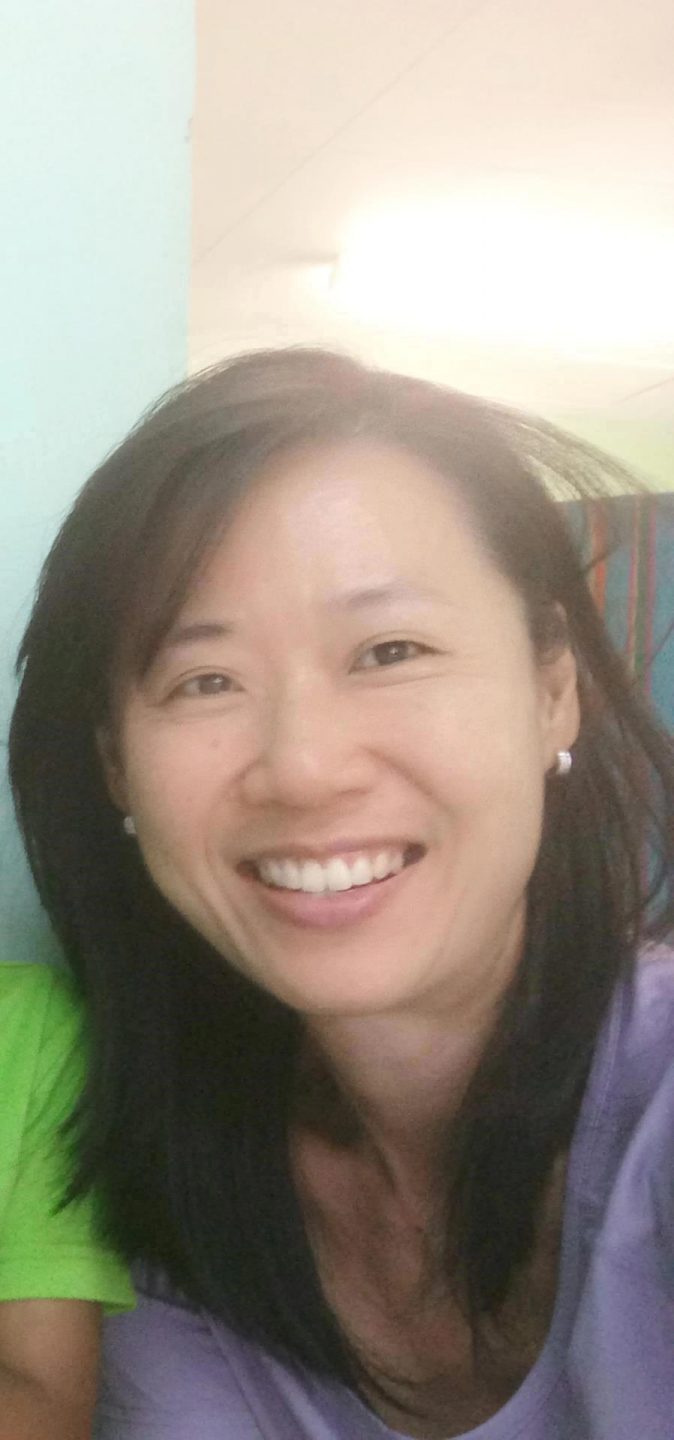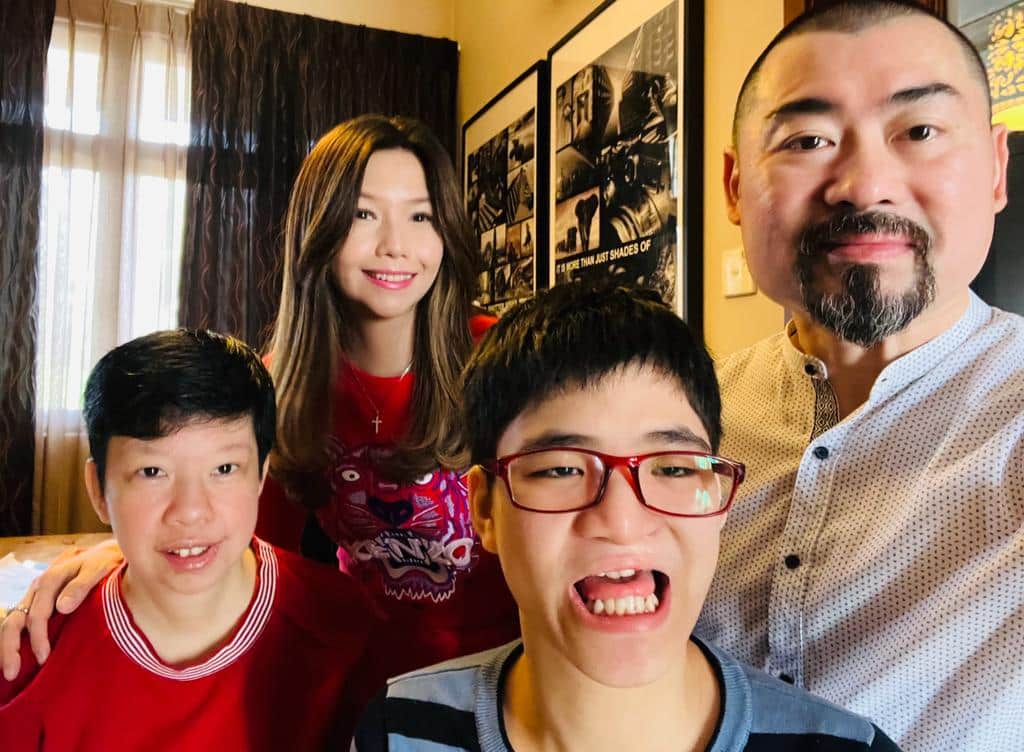On the frontlines and far from home: Two foreign nurses draw comfort from giving comfort
This series of interviews commemorates Singapore Nurses' Day on August 1, 2020. Salt&Light salutes all nurses for their dedication and care!
Ting Siew Lee // July 31, 2020, 5:39 pm

Michelle Sally Atong, from Sarawak, was caught up in the frantic exodus of Malaysians to Singapore before the border closed. She does not know when she will see her family again, but finds joy in service during this crisis. Photo courtesy of Michelle Sally Atong.
As COVID-19 infections spiked in country after country, borders closed all across the world, and international flights stopped suddenly.
Thirty-year old nurse Michelle Sally Atong was one of those who was caught up in the frantic exodus of Malaysians to Singapore before the border closed. What was supposed to be a leisurely one-week trip back to her hometown, Betong, Sarawak, became like an episode out of the Amazing Race.
“I worry for them because I can’t see them. I just pray they will be protected from the virus.”
Michelle had just touched down in Sarawak on the night of March 15. From there, she had driven four hours to Betong. Michelle is Iban, one of the indigenous people groups of Sarawak.
But the next day, Michelle turned on her mobile phone to see a flurry of updates from Singapore.
“If I couldn’t return by that day, I would need a letter from the Ministry of Manpower in order to fly into Singapore.”
That same day, Malaysia announced that the Movement Control Order (MCO) would kick in on the 18th and that the border would be closed.
The race home
Shocked by the sudden turn of events, Michelle asked her parents for advice. “My dad said that, since my work commitment is in Singapore, I should just go back.”
But how, at such short notice? All the flights out on the 16th were fully booked by people in the same predicament.
“The earliest day I could fly out was on the 17th. I didn’t even unpack. It was like a race. I left Betong at around 6am to reach the airport in Sibu at around 8am.
“If I pray, I get through my shift well. Some people may say it’s just luck, but I believe that God is with me.”
“The flight to Johor Bahru was at 10am, and would take three hours. I reached JB at around noon. At the checkpoint, I saw the same travellers on my flight! The people who were working in Singapore all made the effort to rush back before the MCO started.”
By then, land travel was the only way for S-pass holders to enter Singapore without needing prior clearance from the Ministry of Manpower.
Michelle does not know when she will see her family again after that briefest of trips home, just before the border closed.
“Because I work in healthcare, I have more anxiety about my family because I know how this virus spreads. I constantly remind my family that only one person should go out for essential errands and remind them to observe hand hygiene before going home. I worry for them because I can’t see them. I just pray they will be protected from the virus.”
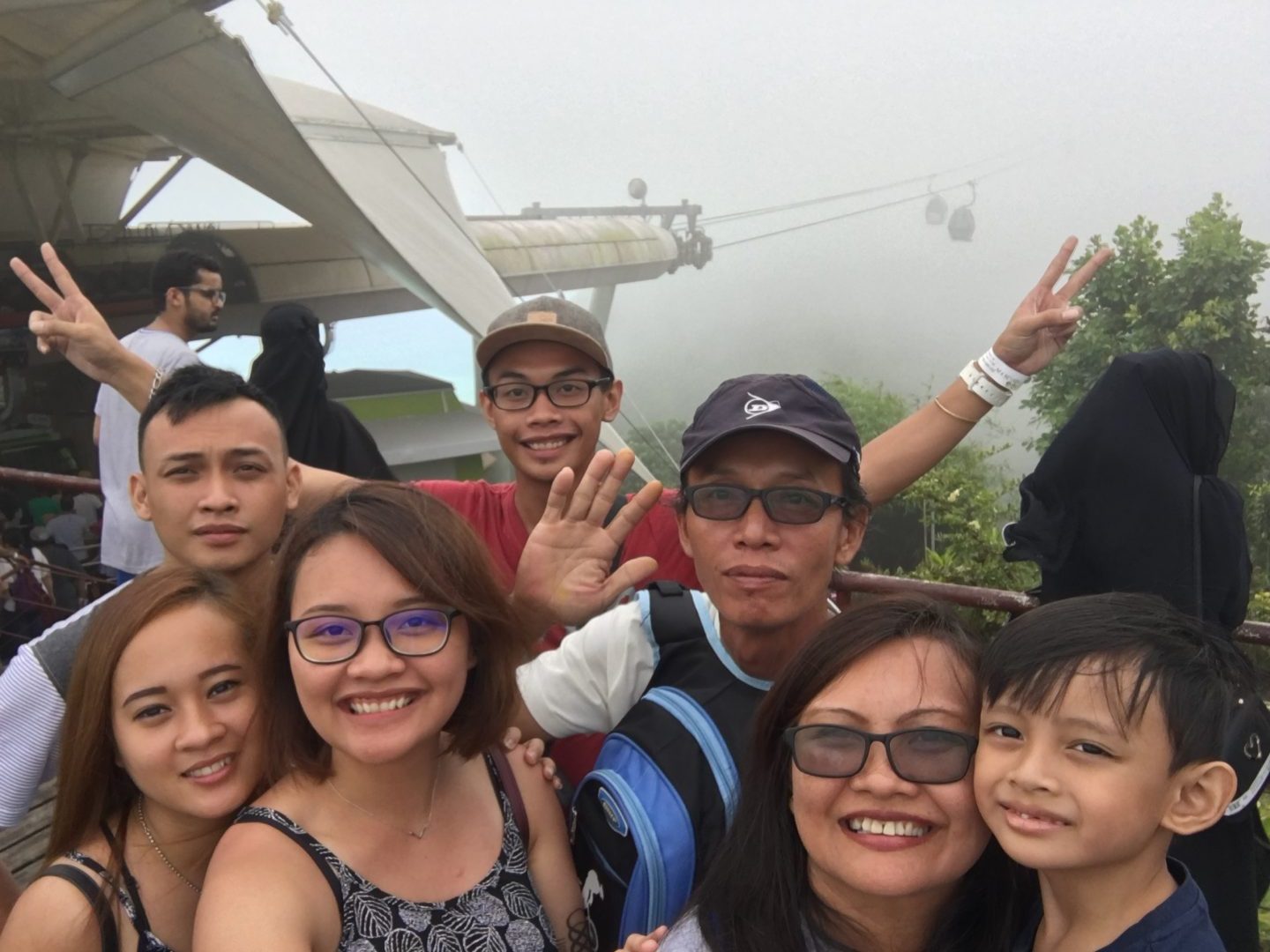
Michelle (3rd from left) and her family. Unable to see one another often, Michelle prays for her family’s safety and reminds them to stay home and practise hand hygiene.
It is evident that prayer has become an important part of Michelle’s life. She shares that she has discerned a pattern to her day.
“If I forget to pray after I wake up, I realise that my shift that day will be very chaotic. If I pray, I get through my shift well. Some people may say it’s just luck, but I believe that God is with me.”
Serving in a time of crisis
The pandemic has given Michelle new insights into her profession as a nurse.
“When I first joined nursing five years ago, I never expected to be working during a pandemic. Before this, nursing was just a job to provide for myself and my family. Now, I love nursing. We get to serve people in a time of crisis.”
The nature of nursing is such that Michelle cannot anticipate the events that may unfold throughout a shift. One verse that gives her peace is Philippians 4:13: I can do all things through Christ who strengthens me.”
“Philippians 4:13 reminds me that I am not doing this alone and God is with me.”
“Sometimes, our workload is heavy and we are not sure what’s going to happen during our shift. This verse reminds me that I am not doing this alone and God is with me. I remind myself that, no matter how busy I am, I will finish each shift well and go home. ”
Michelle says the appreciation that she receives from her patients also inspires her to keep going.
She recalls an incident in her third year of nursing: “One of my elderly patients couldn’t walk. I pushed her to the toilet in a wheelchair. After she finished, she couldn’t stand because of weakness in her legs.
“I knelt down to help her put on her pants. She cupped my face with both hands and said, ‘Thank you very much’ in such an appreciative way. She felt bad for not being able to dress herself. That was the nicest gesture I have ever received from a patient.”
The wheelchair
When her nursing manager issued a call in early March for volunteers to serve at the screening centre of the National Centre for Infectious Diseases (NCID), another foreign nurse, 35-year old Zer Thwe from Myanmar, jumped at the opportunity.
“Five years ago when I joined Tan Tock Seng Hospital, a senior nurse who had served during the SARS outbreak spoke at our on-boarding session,” explains the soft-spoken nurse, who worked at the day surgery centre before moving to the screening centre of NCID.
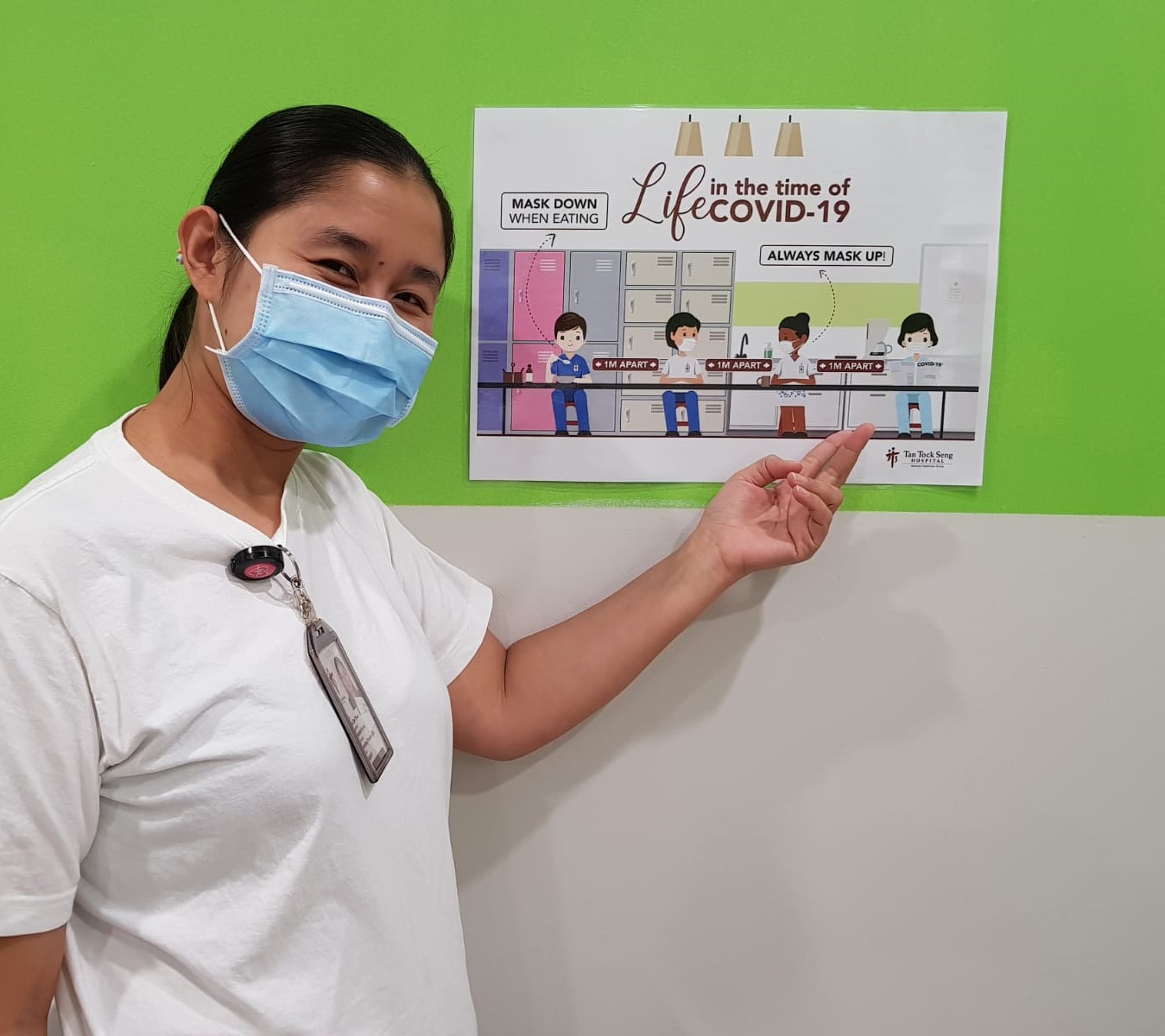
When there was a call for volunteers to serve at NCID, the 35-year old nurse from Myanmar jumped at the opportunity to be at the frontlines. In true humility, Zer Thwe describes her work at the screening centre as “ordinary” but meaningful to her. Photo courtesy of Zer Thwe.
“I felt that they were so noble to help during such a difficult time. That’s why I volunteered to go to the NCID in March when there was a call for volunteers.”
“He said ‘thank you’. It was a small gesture that made him feel better. Immediately, I thought of Matthew 25:40.”
Down-to-earth and humble, Zer Thwe downplays her contributions while serving in the frontlines of Singapore’s battle against the COVID-19 pandemic.
More than once, she describes her work as “ordinary” but deeply meaningful to her.
“Some of the migrant workers are not used to the aircon when they are at the screening centre. When I offer them a blanket, they are very happy. I can see the change in their expressions and it makes me satisfied.”
Zer Thwe recalls a seemingly ordinary encounter that became personally significant.
She describes how a migrant worker looked very frail as he alighted from the ambulance.
“I offered him a wheelchair. He said ‘thank you’. It was a small gesture that made him feel better. Immediately, I thought of Matthew 25:40: ‘Whatever you did for one of the least of these brothers and sisters of mine, you did for me.’”
She also remembers an incident where she observed that some migrant workers were not eating their dinner. When she approached them to ask why, they said they would only eat after getting their test results back.
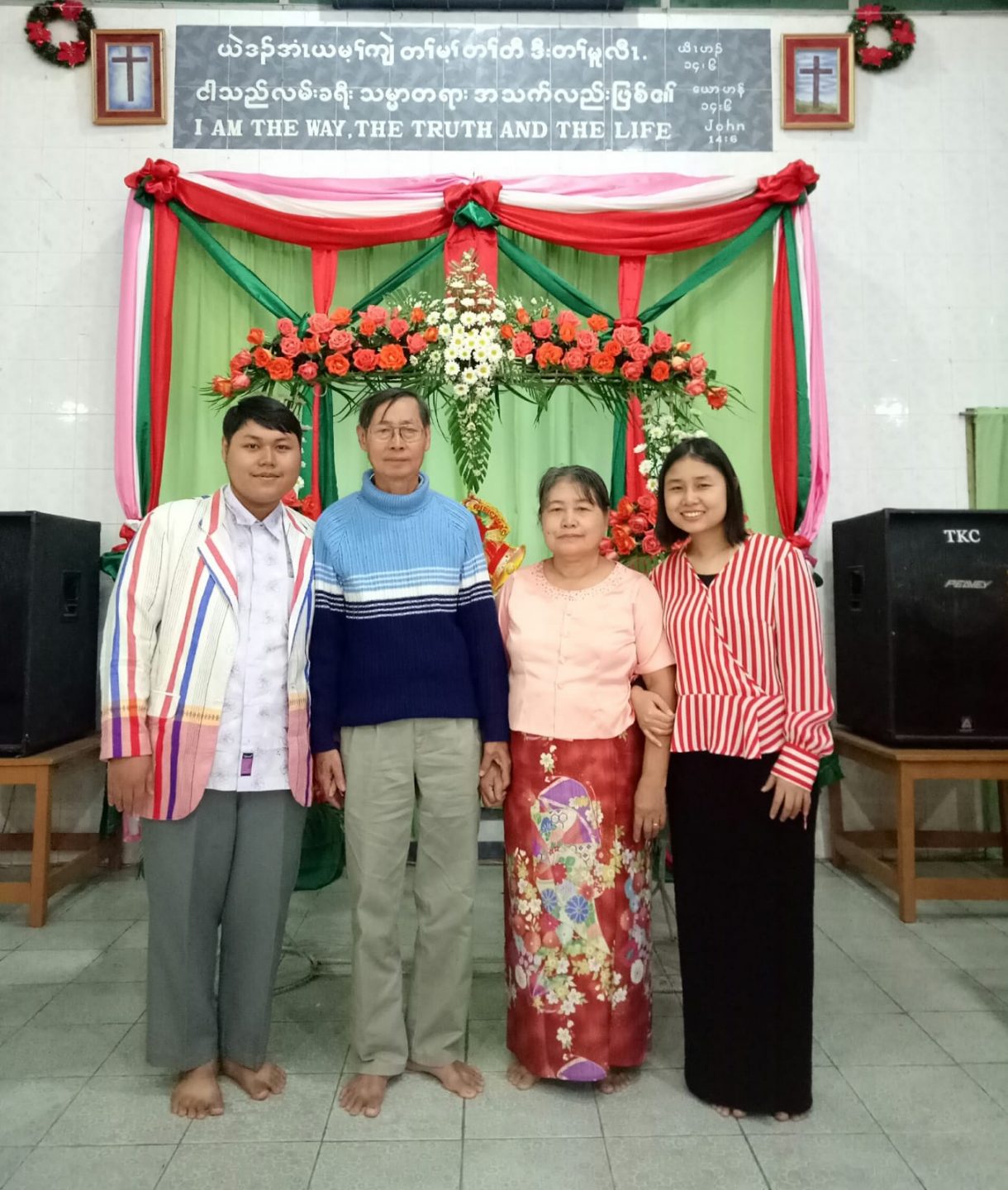
Zer Thwe (extreme right) with her family at their home church in Taungoo, Myanmar, during Christmas 2018. “My parents always tell me we are covered by the blood of Jesus and one day, we will meet again.” Photo courtesy of Zer Thwe.
“I told them it would take six to eight hours to get back the results and encouraged them to eat first so they would have strength. After my encouragement, they started to eat. I felt happy that I could make a small difference through my work.”
Part of her duties includes escorting the confirmed COVID-19 cases from the screening area to a designated zone. As they walk, Zer Thwe comforts them.
“I encourage them that I will pray for them, and that the hospital will take good care of them. I tell them to rest and drink a lot of water.”
“The pandemic does not own me, God does”
Initially, she had to get used to new routines at the screening centre, like the wearing of Personal Protective Equipment (PPE). It took some time to adjust to wearing a mask and goggles for such long hours.
“I timed my toilet breaks with my break times, when I could take off my PPE,” she says with a grin.
“Every day, I declare Psalm 91 and Psalm 121 to strengthen myself.”
As we chat, it is obvious that Zer Thwe draws strength from her spiritual and professional community, and from God.
“Even though we cannot go to church, I always try to attend my church online service. I would ask for Sunday off, or request to work the night shift, so I can attend the online service in the morning.
“My pastor shared that the pandemic does not own you, you are owned by God! Every day, I declare Psalm 91 and Psalm 121 over myself. I proclaim the Word of God to strengthen myself.”
Zer Thwe is also energised by the team she works with. There are at least 70 staff on each shift to care for the cases that are sent to the screening centre. It is a diverse team of professionals that includes, not just doctors and nurses, but also allied healthcare professionals like medical social workers and psychologists.
“There is a strong team spirit and we appreciate one another’s help. Even though we are busy, we are still joyful.”
We will meet again
Zer Thwe has been in Singapore since 2007. She last saw her family in August 2019, and does not know when she will see them again because of the border closures and flight suspensions.
“My parents always tell me we are covered by the blood of Jesus. One day, we will meet again.”
She texts her mother every day and video calls her twice a week. At the start of the outbreak, she worried for the well-being of her family in Myanmar. But now she is at peace and confident in God’s protection.
“My parents always tell me we are covered by the blood of Jesus. One day, we will meet again.”
The desire to go the extra mile to serve also inspired Zer Thwe to produce a video of common Myanmese words used in a medical setting to help bridge the language divide between English speakers and migrant workers from Myanmar.
In the six-minute video, Zer Thwe teaches the Myanmese pronunciation of words like “fever”, “sore throat” and “cough”. The video has registered over 4,000 views since it was posted on Facebook in May.
About one-third of nurses in Singapore are foreigners. As they fight alongside Singaporeans in the frontlines, nurses like Michelle and Zer Thwe, who are far from home and family, draw strength from God to comfort others.
This is the third story in a series of interviews to commemorate Singapore Nurses’ Day on August 1, 2020. You can find the other stories are below.
“Less of me and more of You”: A nurse’s journey from aesthetic medicine to end-of-life care
Palliative care nurses: Bedside angels to the dying and their families
We are an independent, non-profit organisation that relies on the generosity of our readers, such as yourself, to continue serving the kingdom. Every dollar donated goes directly back into our editorial coverage.
Would you consider partnering with us in our kingdom work by supporting us financially, either as a one-off donation, or a recurring pledge?
Support Salt&Light